Use Both Brakes
- toolmaker
-
- Offline
- User
-

Registered
- Posts: 217
- Thanks: 19
Re: Use Both Brakes
02 Apr 2016 05:36
Probably just riding 5 feet in front of the bike too. You should always look WAY ahead for the car the is in front of you. :whistle:
I live near Portland, Oregon and my rider is a '76 KZ900 I bought new. I'm also in the process of restoring another one and a '73 Z1.
Please Log in or Create an account to join the conversation.
- 650ed
-
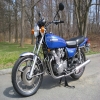
- Offline
- User
-

Registered
- Posts: 15336
- Thanks: 2833
Re: Use Both Brakes
02 Apr 2016 05:38
+1 ! Ed
1977 KZ650-C1 Original Owner - Stock (with additional invisible FIAMM horn)
Please Log in or Create an account to join the conversation.
- SWest
-
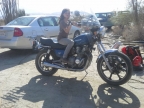
- Offline
- Sustaining Member
-

Registered
- 10 22 2014
- Posts: 23673
- Thanks: 2968
Re: Use Both Brakes
02 Apr 2016 05:49
It's clear he was a novice. I generally ride with my fingers resting on the brake lever. Easier on my worn out carpenter paws. :whistle: I have a cruise control and a cramp buster as well. When braking the front gets used first. It's instinctive. I had a chick stop dead in front of me at 45 and I locked up the front tire. BTCH.  Used both brakes and barely missed her. No time to do anything else. These skills come with time and when I see bobbers and the like I wonder how long they will still be around.
Used both brakes and barely missed her. No time to do anything else. These skills come with time and when I see bobbers and the like I wonder how long they will still be around. 
Steve
Steve
Z1b1000 1975 Z1b
kzrider.com/forum/11-projects/598262-kz-...-will-it-live#672882
kzrider.com/forum/2-engine/597654-poser?start=240#704229
kzrider.com/forum/11-projects/598262-kz-...-will-it-live#672882
kzrider.com/forum/2-engine/597654-poser?start=240#704229
Please Log in or Create an account to join the conversation.
- loudhvx
-
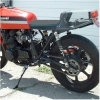
- Offline
- KZr Legend
-

Registered
- Posts: 10863
- Thanks: 1622
Re: Use Both Brakes
02 Apr 2016 10:04
When I watch the video, I see his foot hit the brake hard as the brake light comes on. No skidding yet. Then I see the front end take a little dip, at which point the rear locks up, without any change in foot application. In my opinion, the mistake was applying a large amount of rear brake first, then hitting the front. Hitting the front shifted just enough weight forward to lock the rear.
I prefer to use the front and slowly add rear as the frame settles a bit from the front application. But in this case, I'd probably opt for the shoulder.
On a different subject, I'm not convinced motorcycles necessarily stop faster than cars, though I see that written as fact quite often. That's a broad statement covering a lot of cases that would differ. (I would not be surprised if a new minivan stops faster than a stock Kz.)
I prefer to use the front and slowly add rear as the frame settles a bit from the front application. But in this case, I'd probably opt for the shoulder.
On a different subject, I'm not convinced motorcycles necessarily stop faster than cars, though I see that written as fact quite often. That's a broad statement covering a lot of cases that would differ. (I would not be surprised if a new minivan stops faster than a stock Kz.)
1981 KZ550 D1 gpz.
Kz550 valve train warning.
Other links.
Kz550 valve train warning.
Other links.
Please Log in or Create an account to join the conversation.
- theApehouse
-
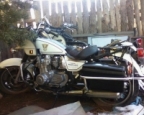
- Offline
- User
-

Registered
- Posts: 41
- Thanks: 11
Re: Use Both Brakes
02 Apr 2016 10:14
There's so much more to riding a motorcycle than the basic concepts of 'throttle' and 'brake', that driving a car can give you the illusion of. (as so many of the comments in this thread illustrate). I believe there's always more we can learn too. I always recommend taking a riding course to new riders (for those that don't have the benefit of riding with a moto veteran, whose knowledge they can tap into) And both would be better
1987 KZ1000P, dynatek 2.2 coils
www.youtube.com/channel/UC3VtY1XWwKH3zK2trI2Hz1w
www.youtube.com/channel/UC3VtY1XWwKH3zK2trI2Hz1w
Please Log in or Create an account to join the conversation.
- 650ed
-

- Offline
- User
-

Registered
- Posts: 15336
- Thanks: 2833
Re: Use Both Brakes
02 Apr 2016 11:10loudhvx wrote: .....On a different subject, I'm not convinced motorcycles necessarily stop faster than cars, though I see that written as fact quite often. That's a broad statement covering a lot of cases that would differ. (I would not be surprised if a new minivan stops faster than a stock Kz.)
I do agree that at least most modern cars can stop in a shorter distance than a KZ. However, the car in the video didn't appear to be doing anything close to a panic stop. The bike, on the other hand, had a pretty long distance between it and the car when the car initially slowed down, so it should have been able to avoid hitting the car. As you pointed out the bike rider hit the rear brake hard, and assuming that little dip of the front of the bike was caused by him applying the front brake he used the front brake far too late.
It sounds like you and I use the brakes very much the same way - use the front and slowly add rear as the frame settles a bit from the front application. If the guy in the video ever decides to ride again he should first get some instruction on braking and on how to avoid target fixation. Ed
1977 KZ650-C1 Original Owner - Stock (with additional invisible FIAMM horn)
Please Log in or Create an account to join the conversation.
- SWest
-

- Offline
- Sustaining Member
-

Registered
- 10 22 2014
- Posts: 23673
- Thanks: 2968
Re: Use Both Brakes
02 Apr 2016 12:48
THAT'S IT TARGET FIXATION 
Steve
Steve
Z1b1000 1975 Z1b
kzrider.com/forum/11-projects/598262-kz-...-will-it-live#672882
kzrider.com/forum/2-engine/597654-poser?start=240#704229
kzrider.com/forum/11-projects/598262-kz-...-will-it-live#672882
kzrider.com/forum/2-engine/597654-poser?start=240#704229
Please Log in or Create an account to join the conversation.
- Irish-Kawi
-
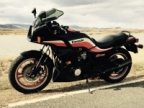
- Offline
- User
-

Registered
- Posts: 498
- Thanks: 37
Re: Use Both Brakes
02 Apr 2016 14:00loudhvx wrote: When I watch the video, I see his foot hit the brake hard as the brake light comes on. No skidding yet. Then I see the front end take a little dip, at which point the rear locks up, without any change in foot application. In my opinion, the mistake was applying a large amount of rear brake first, then hitting the front. Hitting the front shifted just enough weight forward to lock the rear.
I prefer to use the front and slowly add rear as the frame settles a bit from the front application. But in this case, I'd probably opt for the shoulder.
On a different subject, I'm not convinced motorcycles necessarily stop faster than cars, though I see that written as fact quite often. That's a broad statement covering a lot of cases that would differ. (I would not be surprised if a new minivan stops faster than a stock Kz.)
Absolutely see and agree with where you are coming from. All things being equal then yes a bike should stop faster due to less weight and less mass to slow down, its simple physics. However the real world is messy and nothing is ever "equal" so that laboratory setting just flat out never happens. We are also taking about 40+ years of technology change between brand new modern cars and these old "high performance" bikes (at the time they were cutting edge and high performance, but by current standards it is archaic and grossly outdated) and there is just no way that even an economy modern car would take longer to brake with modern rubber, braking materials, ABS and all of that to be shown up by a 40 year old bike.
Im not hating on vintage bikes, quite the opposite as I absolutely love these bikes, but I am a realist and live in this world and know the limitations of what this technology is and can accomplish.versus brand new tech. Maybe I am being too critical and too cynical, but I would rather stack the deck in my favor and err on the side of caution and underestimate what the brakes can do versus what I hope they can do.
Just my two cents, I'm sure I am far more cynical than most though... :laugh:
Brett
All the gear all the time!
1985 Kawasaki GPz 750 (ZX750-A3) 15,000 original miles www.kzrider.com/forum/11-projects/601230...z750-refresh-project
Father - Husband - Bourbonr - Rider
1985 Kawasaki GPz 750 (ZX750-A3) 15,000 original miles www.kzrider.com/forum/11-projects/601230...z750-refresh-project
Father - Husband - Bourbonr - Rider
Please Log in or Create an account to join the conversation.
- loudhvx
-

- Offline
- KZr Legend
-

Registered
- Posts: 10863
- Thanks: 1622
Re: Use Both Brakes
02 Apr 2016 14:49650ed wrote:loudhvx wrote: .....On a different subject, I'm not convinced motorcycles necessarily stop faster than cars, though I see that written as fact quite often. That's a broad statement covering a lot of cases that would differ. (I would not be surprised if a new minivan stops faster than a stock Kz.)
I do agree that at least most modern cars can stop in a shorter distance than a KZ. However, the car in the video didn't appear to be doing anything close to a panic stop. The bike, on the other hand, had a pretty long distance between it and the car when the car initially slowed down, so it should have been able to avoid hitting the car. As you pointed out the bike rider hit the rear brake hard, and assuming that little dip of the front of the bike was caused by him applying the front brake he used the front brake far too late.
It sounds like you and I use the brakes very much the same way - use the front and slowly add rear as the frame settles a bit from the front application. If the guy in the video ever decides to ride again he should first get some instruction on braking and on how to avoid target fixation. Ed
I agree. The braking ability of the bike was not an issue in this crash. It was definitely one or more of inexperience and panic and fixation.
I just found it interesting when I searched the stopping distances of common some cars and motorcycles. The range of stopping distances overlap quite a bit, and the car/van/(and maybe even some pickups) stop sooner than some modern bikes (including sporty bikes). I just don't think a generalized statement can or should be made about stopping ability. Yes, bikes are lighter, but their contact patches are much smaller. Nowadays, ABS plays a huge role in the final stopping distance, apparently, such it may be the final determining factor.
1981 KZ550 D1 gpz.
Kz550 valve train warning.
Other links.
Kz550 valve train warning.
Other links.
Please Log in or Create an account to join the conversation.
- RonKZ650
-
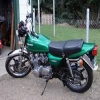
- Offline
- User
-

Registered
- Posts: 3713
- Thanks: 250
Re: Use Both Brakes
02 Apr 2016 18:58
We're not on a modern motorcycles newsgroup, or the whole discuss would center around how ABS would have fixed this rider error. In case anyone is thinking that, application of rear brake with no front on ABS results in rear attempting to lock, then the brakes are released and smash into whatever is in front. In this case that may have been better, maybe not, but ABS is not a cure. No one asked about ABS, but it sucks in my opinion.
321,000 miles on KZ's that I can remember. Not going to see any more.
Please Log in or Create an account to join the conversation.
- SWest
-

- Offline
- Sustaining Member
-

Registered
- 10 22 2014
- Posts: 23673
- Thanks: 2968
Re: Use Both Brakes
02 Apr 2016 19:03 - 02 Apr 2016 19:03
I don't like it especially on dirt roads. Hope this guy doesn't visit KZR, he'd feel down right shamed about now. :whistle:
Steve :lol:
Steve :lol:
Z1b1000 1975 Z1b
kzrider.com/forum/11-projects/598262-kz-...-will-it-live#672882
kzrider.com/forum/2-engine/597654-poser?start=240#704229
kzrider.com/forum/11-projects/598262-kz-...-will-it-live#672882
kzrider.com/forum/2-engine/597654-poser?start=240#704229
Last edit: 02 Apr 2016 19:03 by SWest.
Please Log in or Create an account to join the conversation.
- Olajoe
-
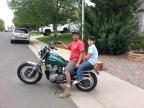
- Offline
- User
-

Registered
- Free at last
- Posts: 133
- Thanks: 17
Re: Use Both Brakes
02 Apr 2016 20:13
It's situations like these I think the testing should be changed. They make you do the speed up real fast, then stop real quick. You cannot pass this part without using both brakes unless you are not fully accelerating and how can they - the testers - measure whether or not your fully pinning the throttle? The testing should also include driving with no brakes. I think 9 out of 10 times of someones brakes go out, they still would drive it home. Now, understand, i grew up on an island and was riding dirt bikes at a young age before I knew how to ride a paddle bike. It was different then. Brakes was considered a luxury. The more you use it, the faster you have to replace it. Now, if Im using brakes, it's because I'm following to close. When you can ride without using brakes it becomes easier to appreciate having a crisp throttle. In this accident- which btw that is a terrible one they way it landed on him- and who knows maybe one day that guy want to ride a vintage cruizer so I think that was very humbling. But again when you don't have brakes you put the control of the bike more in your hands than the mercy of the pavement or the rubber on your tires. You never hear someone say when in doubt stomp the brakes,you grab a handful and throttle out.
Yes it's easy to comment on this video especially from behind a keyboard safe at home without knowing the conditions a lot of things could of happened. But the important question should be what this guy chooses to do to prevent this from happening again. If he practice riding without brakes and on different vehicles off the public road that can't make his road riding any worse .
Yes it's easy to comment on this video especially from behind a keyboard safe at home without knowing the conditions a lot of things could of happened. But the important question should be what this guy chooses to do to prevent this from happening again. If he practice riding without brakes and on different vehicles off the public road that can't make his road riding any worse .
Please Log in or Create an account to join the conversation.
Moderators: Street Fighter LTD
